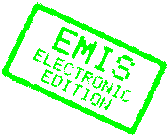Dense Sphere Packings from New Codes
Jürgen Bierbrauer
and Yves Edel
DOI: 10.1023/A:1008733715001
Abstract
The idea behind the coset code construction (see [G.D. Forney, Coset Codes, IEEE Transactions on Information Theory, Part I: Introduction and Geometrical Classification, pp. 1123-1151; Part II: Binary lattices and related codes, pp. 1152-1187; F.R. Kschischang and S. Pasupathy, IEEE Transactions on Information Theory 38 (1992), 227-246.]) is to reduce the construction of sphere packings to error-correcting codes in a unified way. We give here a short self-contained description of this method. In recent papers [J. Bierbrauer and Y. Edel, IEEE Transactions on Information Theory 43 (1997), 953-968; J. Bierbrauer and Y. Edel, Finite Fields and Their Applications 3 (1997), 314-333; J. Bierbrauer and Y. Edel, IEEE Transactions on Information Theory 44 (1998), 1993; J. Bierbrauer, Y. Edel, and L. Tolhuizen, Finite Fields and Their Applications, submitted for publication.] we constructed a large number of new binary, ternary and quaternary linear error-correcting codes. In a number of dimensions our new codes yield improvements. Recently Vardy [A. Vardy, Inventiones Mathematicae 121, 119-134; A. Vardy, Density doubling, double-circulants, and new sphere packings, Trans. Amer. Math. Soc. 351 (1999), 271-283.] has found a construction, which yields record densities in dimensions 20, 27, 28, 29 and 30. We give a short description of his method using the language of coset codes. Moreover we are able to apply this method in dimension 18 as well, producing a sphere packing with a record center density of (3/4) 9.
Pages: 95–100
Keywords: sphere packing; lattice; code; center density; hexagonal lattice; dual code; Mordell's inequality; Leech lattice
Full Text: PDF
References
1. J. Bierbrauer and Y. Edel, “New code parameters from Reed-Solomon subfield codes,” IEEE Transactions on Information Theory 43 (1997), 953-968.
2. J. Bierbrauer and Y. Edel, “Extending and lengthening BCH-codes,” Finite Fields and Their Applications 3 (1997), 314-333.
3. J. Bierbrauer and Y. Edel, “Inverting construction Y1,” IEEE Transactions on Information Theory 44 (1998), 1993.
4. J. Bierbrauer, Y. Edel, and L. Tolhuizen, “New codes via the lengthening of BCH codes with UEP codes,” Finite Fields and Their Applications, submitted for publication.
5. J.H. Conway and N.J.A. Sloane, Sphere Packings, Lattices and Groups, Springer 1988, 1993.
6. G.D. Forney, Coset Codes, IEEE Transactions on Information Theory, Part I: Introduction and Geometrical Classification, pp. 1123-1151; Part II: Binary lattices and related codes, pp. 1152-1187.
7. F.R. Kschischang and S. Pasupathy, “Some ternary and quaternary codes and associated sphere packings,” IEEE Transactions on Information Theory 38 (1992), 227-246.
8. A. Vardy, “A new sphere packing in 20 dimensions,” Inventiones Mathematicae 121, 119-134.
9. A. Vardy, “Density doubling, double-circulants, and new sphere packings,” Trans. Amer. Math. Soc. 351 (1999), 271-283.
2. J. Bierbrauer and Y. Edel, “Extending and lengthening BCH-codes,” Finite Fields and Their Applications 3 (1997), 314-333.
3. J. Bierbrauer and Y. Edel, “Inverting construction Y1,” IEEE Transactions on Information Theory 44 (1998), 1993.
4. J. Bierbrauer, Y. Edel, and L. Tolhuizen, “New codes via the lengthening of BCH codes with UEP codes,” Finite Fields and Their Applications, submitted for publication.
5. J.H. Conway and N.J.A. Sloane, Sphere Packings, Lattices and Groups, Springer 1988, 1993.
6. G.D. Forney, Coset Codes, IEEE Transactions on Information Theory, Part I: Introduction and Geometrical Classification, pp. 1123-1151; Part II: Binary lattices and related codes, pp. 1152-1187.
7. F.R. Kschischang and S. Pasupathy, “Some ternary and quaternary codes and associated sphere packings,” IEEE Transactions on Information Theory 38 (1992), 227-246.
8. A. Vardy, “A new sphere packing in 20 dimensions,” Inventiones Mathematicae 121, 119-134.
9. A. Vardy, “Density doubling, double-circulants, and new sphere packings,” Trans. Amer. Math. Soc. 351 (1999), 271-283.
